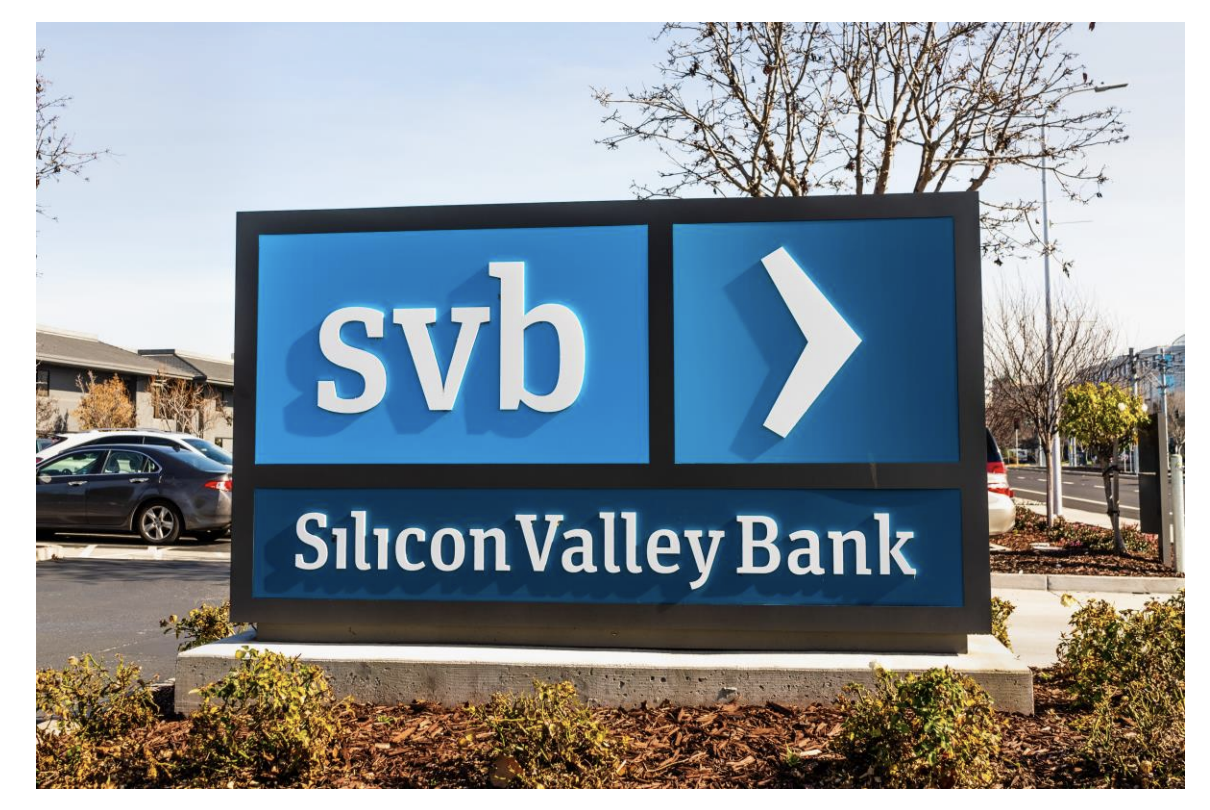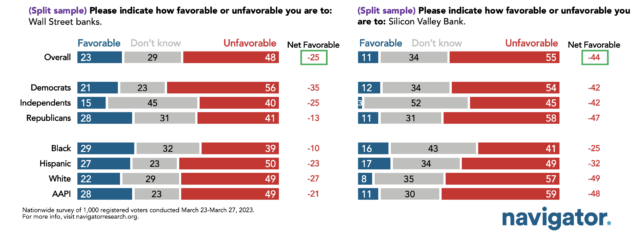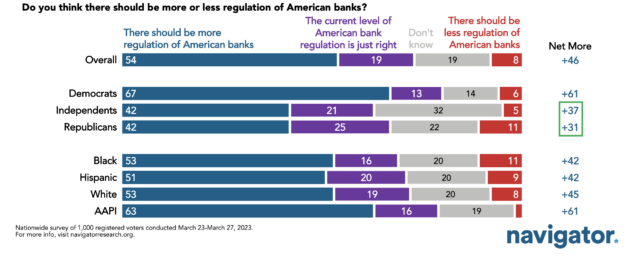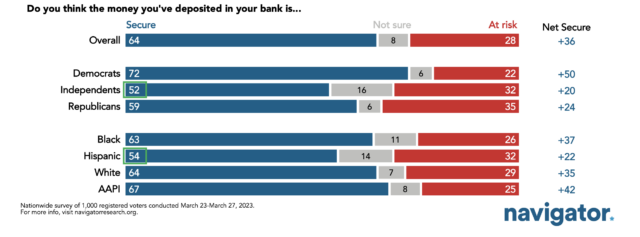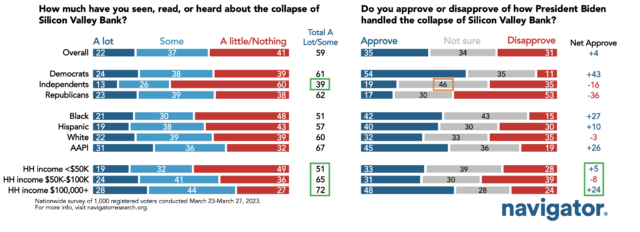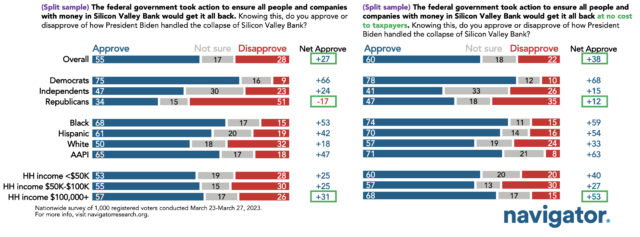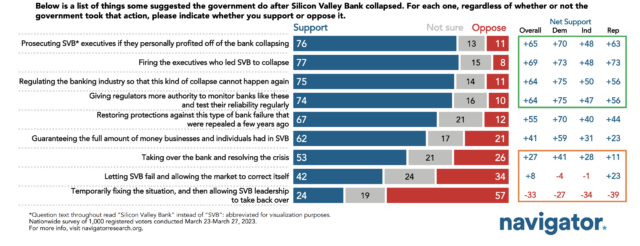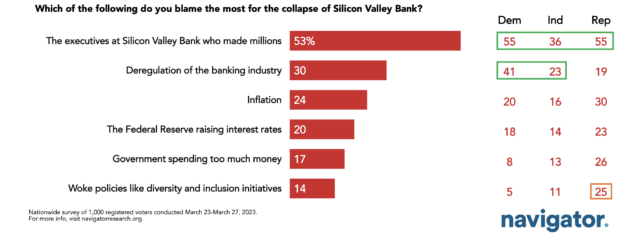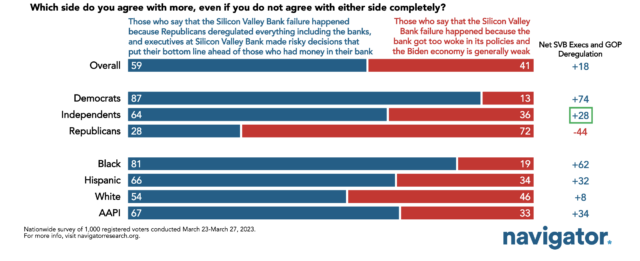- A majority of Americans believe there should be more regulation of American banks, even as most feel secure about their own bank deposits.
- Only one in five are hearing a lot about the collapse of Silicon Valley Bank; when explaining the government’s response on SVB’s collapse, including that it did not spend taxpayer dollars, most approve of Biden’s handling of the issue.
- Americans are most likely to blame SVB executives and banking deregulation for the collapse; three in five blame Republicans and SVB executives more than “woke” policies and “the Biden economy” generally.
Wall Street Banks Broadly Are Underwater While Silicon Valley Bank Is Even More Deeply So
Views of Silicon Valley Bank (net -44 favorable) are a net 19 points further underwater than views of Wall Street banks (net -25), though both are viewed unfavorably by around half of Americans.
A Majority Want More Regulations on Banks, Including Bipartisan Pluralities
Majorities of Democrats (67% more) and every racial group say “there should be more regulation of American banks,” while pluralities of independents (net +37) and Republicans (net +31) agree.
Most Americans Feel Their Money Is Secure in the Bank, Though One in Three Are Not Sure or Say It Is At Risk
While majorities of every partisan and racial group say the money they’ve deposited is “secure,” independents (52% secure) and Hispanic Americans (54%) are least likely to say so.
- Americans under the age of 35 (41%) and very conservative Republicans (40%) are among the groups most likely to say the money they’ve deposited in their bank is at risk.
Just One in Five Are Hearing “a Lot” About the SVB Collapse, and Many Are Unsure About Biden’s Response
Democrats (61% “a lot”/”some”) and Republicans (62%) are hearing more about the collapse than independents (39%). Still, a third of Democrats (35%), three in ten Republicans (30%), and almost half of independents (46%) are not sure how to rate Biden’s response.
- Those with over $100,000 a year in household income are most likely to have heard about it (72%) and approve of Biden (net +24).
Biden’s Approval Improves When Learning All Money Was Guaranteed by the Government and At No Cost to Taxpayers
Explaining that the federal government ensured all people and companies got their money back from Silicon Valley Bank drives net approval of Biden’s handling to net +27 (from +4 on the uninformed ask). When it is added that the action was taken at “no cost to taxpayers,” net approval goes up to +38.
Holding Those in Charge at SVB Responsible and Increasing Bank Regulations Are Most Popular Government Responses
Prosecuting SVB executives if they profited off the collapse (net +65 support), firing the executives (net +69), regulating the banking industry (net +64), and giving regulators more authority to monitor banks (net +64) are the most popular responses across the board.
- Letting SVB fail (net +8) and allowing its leadership to take back over after the situation is fixed (net -33) are much less popular.
SVB Executives and Deregulation Are Most to Blame for the Collapse of Silicon Valley Bank; Few Blame Woke Policies
Americans across party lines are most likely to blame “the executives at Silicon Valley Bank who made millions,” while Democrats and independents are second-most likely to blame “deregulation of the banking industry” (41% and 23%, respectively).
- Republicans drive the share who blame “woke policies” (25%, compared to just 5% of Democrats and 11% of independents).
More Blame Republicans, Their Deregulation of Banks, & SVB Executives for the Collapse Than Wokeness or President Biden
Nearly two in three independents (net +28) agree more that the collapse happened “because Republicans deregulated everything including the banks, and executives at SVB made risky decisions” than that “the bank got too woke in its policies.”
